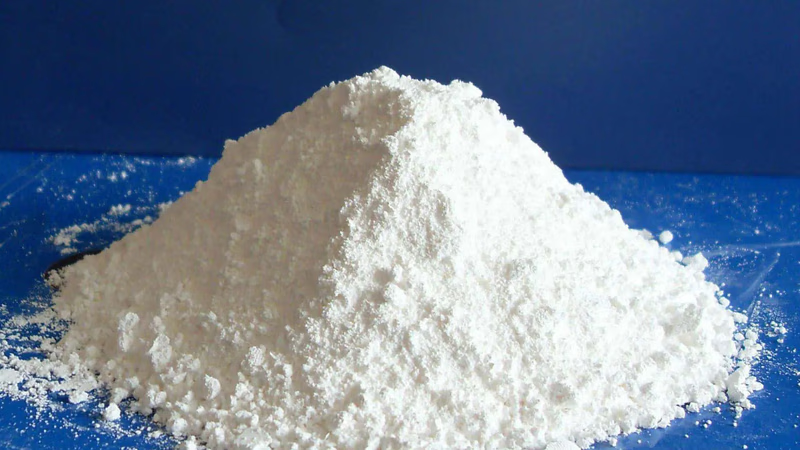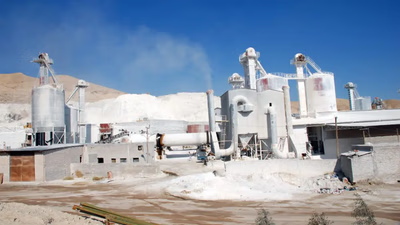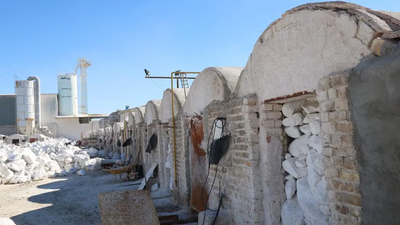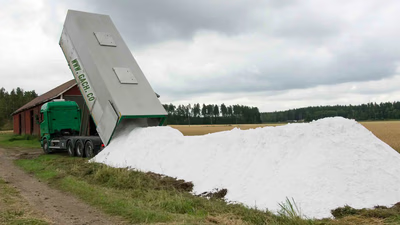
Gypsum plaster applications in construction and renovation projects.
Gypsum plaster, also known as plaster of Paris, is a type of plaster made from the mineral gypsum. Gypsum is a soft sulfate mineral composed of calcium sulfate dihydrate (chemical formula: CaSO4·2H2O). It is a white or colorless mineral found in nature in crystalline form. Gypsum plaster is created by heating gypsum to remove the water content, resulting in a dry powder. When this powder is mixed with water, it rehydrates and forms a paste that can be spread on walls, ceilings, or other surfaces. As the water evaporates, the plaster hardens and sets into a solid, durable surface.
Gypsum is a naturally occurring mineral that can be found in various parts of the world. It is commonly found in sedimentary rock formations and is often associated with deposits of limestone. Some of the major gypsum-producing countries include the United States, China, Iran, Spain, Thailand, and Germany. Many building supply stores carry gypsum products, including gypsum plaster, gypsum board (drywall), and gypsum-based compounds for various applications. These stores may have gypsum available in different forms, such as powder or pre-mixed bags. Local hardware stores often stock construction materials, including gypsum-based products. You can check with them to see if they have gypsum plaster or related items available.
Gypsum plaster is commonly used in construction and renovation projects for creating smooth and even surfaces. It is often used as a base for painting or decorative finishes. Additionally, gypsum plaster is also used in the production of plasterboard or drywall, which is widely used in modern construction for interior walls and ceilings. It's important to note that while gypsum plaster has many benefits, it is not suitable for areas exposed to moisture or water, such as bathrooms or external walls, as it can deteriorate when in contact with excessive moisture. plaster is an abundant mineral that has been formed as a sedimentary layer for millions of years due to the evaporation of saline lakes and shallow seas. Raw plaster is mineral calcium sulfate which has two formulas:
- Formula 1 - hydrated CASO4.2H2O
- Formula 2 - without water CASO4
There are two main sources of plaster in nature, one is sediments left around the coast at sea and the other is raw plaster mines, which are usually the result of severe leaching of sedimentary substrates. Gypsum plaster has been used for centuries as a building material for interior walls and ceilings. It has several advantages, such as its fire-resistant properties, sound insulation capabilities, and ease of application. It can be applied to various surfaces like brick, concrete, or metal lath. One of the unique properties of gypsum plaster is its ability to undergo rehydration, which means it can be dissolved in water and then re-hardened. This property allows for easy repairs and adjustments to the plastered surface.
Numerous online retailers specialize in construction materials and offer gypsum products for purchase. You can search for gypsum plaster or gypsum-related items on e-commerce platforms to find suitable options. Contact local construction material suppliers or distributors in your area. They may have gypsum products available, or they can guide you to reliable sources for obtaining gypsum. In regions with significant gypsum deposits, there might be mines or quarries that extract gypsum. If you are looking for large quantities or direct sourcing, you can explore contacting mining companies or gypsum producers in your area.
-

Plaster and gypsum play a crucial role in the construction industry, primarily for interior wall and ceiling finishing. Gypsum plaster, or plaster of Paris, is mixed with water to create a smooth paste that can be applied to surfaces, providing an even base for painting or decorative finishes. It is also used for creating intricate decorative elements like moldings and cornices, enhancing the aesthetic appeal of spaces. In restoration projects, plaster helps replicate historic designs and repair damaged surfaces. Gypsum boards, commonly known as drywall, are widely utilized as an alternative to traditional plaster applications due to their ease of installation and fire-resistant properties. They contribute to soundproofing and thermal insulation in various settings such as theaters and conference rooms. Plaster can be applied over masonry surfaces to improve durability and weather resistance while offering a visually appealing finish. Additionally, modern construction often employs metal frameworks for interior walls where plaster can be directly applied.
The versatility of gypsum extends beyond construction; it is also significant in the cement industry for enhancing adhesion. Overall, plaster"s multifaceted applications make it indispensable in both new constructions and renovations. "
-

Plaster is a versatile material with significant applications across various industries, particularly in construction, agriculture, and healthcare. In the construction sector, plaster is primarily used for interior finishing, decorative elements, and creating plasterboard panels. Its role extends to the medical field where Plaster of Paris is utilized for making casts and dental molds. In agriculture, gypsum plaster improves soil structure and fertility, enhancing drainage and nutrient uptake while reducing soil compaction. It also plays a crucial role in reclaiming sodic soils and providing essential nutrients like calcium and sulfur to crops. The historical use of plaster in agriculture dates back over 250 years, yet its potential remains underutilized in certain regions like pistachio gardens. Additionally, plaster finds applications in industrial settings such as metal casting and ceramics, where it is used to create molds for intricate designs. Artists also favor plaster for its workability in sculpture creation.
Overall, plaster"s multifaceted uses highlight its importance across diverse sectors. "
-

Gypsum is a versatile mineral with applications across various industries, including agriculture, construction, healthcare, and manufacturing. In agriculture, it serves as a soil amendment that enhances soil structure and nutrient availability by providing essential calcium and sulfur. The construction industry utilizes gypsum in cement production to control setting times and improve the durability of concrete products. Additionally, gypsum is integral in creating plaster molds for ceramics and metal casting, as well as in producing lightweight concrete blocks. In healthcare, gypsum is used for dental molds and medical bandages due to its purity requirements. The food industry benefits from gypsum"s role in sugar production and beverage clarification. Furthermore, gypsum finds applications in the glass industry to regulate melt viscosity and in the petrochemical sector as a drying agent. Its use extends to the paper and paint industries for transparency enhancement and as a filler material. Gypsum"s adaptability makes it an essential component across multiple sectors, highlighting its importance in trade within the Middle East and West Asia.
-

Gypsum and plaster have been utilized for thousands of years, with significant applications in ancient civilizations such as Egypt, Greece, and Rome. The Egyptians used gypsum plaster for tombs and temples, while the Greeks and Romans advanced its use in decorative elements and construction techniques. During the Middle Ages, plasterwork became prominent in Europe, especially in castles and churches. The Renaissance saw a peak in elaborate plaster decorations. Evidence of gypsum use dates back to 9000 years ago in regions like Anatolia and Syria, showcasing its historical significance across various cultures. In modern times, gypsum remains crucial in construction for its fire resistance and sound insulation properties. The Industrial Revolution enhanced gypsum production methods, leading to the widespread adoption of drywall or plasterboard. Today, gypsum products are integral to residential, commercial, and industrial applications.
-

Gypsum plaster, or plaster of Paris, is derived from the mineral gypsum, a soft sulfate mineral composed of calcium sulfate dihydrate. This material is created by heating gypsum to eliminate water content, resulting in a dry powder that rehydrates when mixed with water. It forms a durable paste suitable for application on walls and ceilings. Gypsum is widely available globally, with major production in countries like the United States, China, and Iran. Building supply stores typically stock gypsum products in various forms, including powder and pre-mixed bags. Gypsum plaster is favored in construction for its smooth finish and fire-resistant properties but should not be used in moisture-prone areas due to deterioration risks. Its unique rehydration ability allows for easy repairs and adjustments. Online retailers also offer gypsum products, making it accessible for various construction needs. For bulk purchases or direct sourcing, contacting local mining companies or suppliers can be beneficial.





